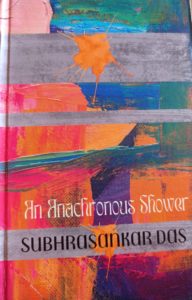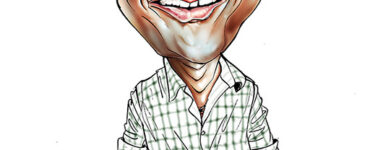The current time looks quite opportune for Indian poetry in English because of the engagement of a large number of poets from all over the country writing in the language. Some voices have made their presence world wide, yet there are some who are yet to make their mark in the literary scenario. Diverse linguistic and cultural backgrounds of these poets, writing in English, add to the richness of this genre. The current column of Poetspeak spotlights An Anachronous Shower by Subhrasankar Das which is a collection of 55 poems. This Tripura based poet’s compositions reveal his understanding of the traditions of his society as well as his political awareness. The poems in this anthology are of various sizes – some more than 30 lines while others just a couplet and they speak about a wide range of issues, from social to imaginative to emotional.
Quite a number of poems in this anthology are concerned with social and political issues. The poet is aware of the crisis that his society is facing and tries to pen them in form of poems. The anthology begins with a short, hard hitting poem, ‘The Alter’ which talks about the loss of faith and a general degradation of values –
“The God is in coma
The legendary lamp-stand is absorbed in contemplation” (7)
In the poem ‘Democracy’ the poet speaks about its emptiness and the sham –
‘The hero has surrendered to the make-up man.’
The short poem is very incisive about the contemporary state of democracy –
‘But the halls are devoid of audience.
The Dolby digital has been clapping all alone’ (11)
He speaks of a democracy where humans, the main participants, are absent from the scenario, pointing at the sham the whole process has become.
In another poem ‘Post Office’ (18), there is a disdain for the parliamentarians who ‘are scampering towards the parliament’ and ‘must practice barking before they take their seats’. There is an element of dehumanisation too.
The anthology, published in 2021 has been dedicated to “all the Frontline COVID Warriors’. The poem ‘The Country of Avengers’ speaks of the COVID times but with a tinge of irony –
‘The sacred emiction of wonder-cow
is our shield against all the mortal diseases.
We have everything..
But we can’t breathe’ (56)
The poem ‘Zero’ is a narrative about a woman, awaiting husband’s approval each day after completing her daily chores, the same husband, whose cheating she could see through. It shows her as a mother and as a wife.
‘In the evening, with a cup of tea,
my uncle would announce
how many points she gathered and for what.
Wearing a plastic smile,
she would faithfully preserve the certificates
and then watch him with her blank, inexpressive eyes,
Like a pit-viper, my aunt could suck the smell
of two different bodies hidden under his favourite perfume.’ (10)
The poet also brings in mental health issues, connecting it with certain social behaviours. The poem ‘Manuscript’ (21) associates depression and expression, one being a shield for the other. The poet personifies ‘depression’ and looks at the ‘manuscript’ as something that gives an ‘artistic’ touch to this mental state. In another poem, ‘Neighbor’ (22), the poet speaks about his ‘home suffering from schizophrenia’. This short, 5-line poem is a powerful subversion of the conventionally accepted notion of the home as a shelter. Here home is not the sweet home but an unfamiliar terrain, almost hostile too.
The poems in this anthology speak of eclectic issues. Some of them also make use of American spelling such as ‘neighbor’, instead of ‘neighbour’. In one of the poems, ‘Zebra Crossing’ (32), Das uses the letter U instead of ‘you’, reminding the readers of the way this letter is often used during various informal correspondences across media.
The poems in this anthology are an enjoyable read. Das mostly writes short, sharp verses which the readers can well connect to.
*









Add comment